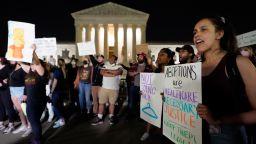When Chief Justice John Roberts announced Tuesday that the Supreme Court will investigate the release of a draft opinion that would strike down Roe v. Wade, he kicked off what will likely be one of Washington’s most unusual leak investigations in recent years.
According to the draft authored by Justice Samuel Alito, the court would overturn Roe’s holding of a federal constitutional right to an abortion.
Roberts called the release “a singular and egregious breach” of trust and said he’s “directed the Marshal of the Court to launch an investigation into the source of the leak.”
It’s unclear, however, how much experience that office has in conducting a probe such as this.
Here’s what we know so far about the draft opinion and the investigation:
When was the draft opinion published and what does it say? The draft opinion was published Monday evening by Politico and was later authenticated by the court. In it, Alito says Roe was “egregiously wrong from the start” and “must be overruled.”
It appears that five justices would be voting to overturn Roe. Roberts did not want to completely overturn Roe v. Wade, meaning he would have dissented from part of Alito’s draft opinion, sources tell CNN. That would mean that the five conservative justices who would make up the majority overturning Roe are Alito and Justices Clarence Thomas, Neil Gorsuch, Brett Kavanaugh and Amy Coney Barrett.
What did Roberts say? Roberts, who has long tried to preserve the court’s independence and reputation, said in a statement that the court “will not be affected in any way” by the leak.
“Court employees have an exemplary and important tradition of respecting the confidentiality of the judicial process and upholding the trust of the Court.”
“I have directed the Marshal of the Court to launch an investigation into the source of the leak,” he said.
Who is the marshal of the Supreme Court? The marshal of the Supreme Court oversees about 260 employees, including the court’s police department, which has the power to arrest people on the grounds of the court. The current marshal is Col. Gail A. Curley, who began serving as the court’s 11th marshal in 2021.
It’s unclear what investigative resources the court’s marshal has and how much experience employees have in finding the source of a leak. If the marshal finds evidence of a possible crime, the court can ask the Justice Department to prosecute someone.
Who had access to the draft opinion? Typically, the people with access to such a document would be the nine justices and the people working in their chambers, including their clerks and staff — nearly 50 people in all.
Why didn’t Roberts ask the Justice Department to investigate the leak?
Roberts has long guarded the independence of the third branch of government, keeping the legislative and executive branches, which include the Justice Department and the FBI, out of the court’s affairs. His decision to have the matter handled — at least initially — internally by a force he controls underscores that desire.
A former leader of the US Marshals Service, the agency responsible for judicial security beyond the confines of the Supreme Court, told CNN it would be unlikely that Roberts would ask an executive branch law enforcement agency to investigate the leak, noting the court is not an organization that enjoys outsiders peering in.
The source also described the marshal of the Supreme Court as differing from traditional law enforcement, describing that role as more like a chief administrative officer with oversight of a police department.
What crime is at play? It’s unclear what crime could be investigated and whether the FBI and the Justice Department have the authority to look into a leak that doesn’t have to do with classified or sensitive information.
Moreover, after leading politically sensitive investigations of presidential candidates and a sitting president in recent years, Justice Department and FBI officials are loath to get the bureau involved in what may end up being a political effort to try to affect the outcome of the court’s final opinion in the case.
“Leaks of government information, by themselves, are not crimes,” said Steve Vladeck, a CNN Supreme Court analyst who’s a professor at the University of Texas School of Law. “Usually, leakers are prosecuted for leaking classified information, which this isn’t, or for offenses related to how they obtained the information they leaked.”
“But without one of those hooks, or some kind of financial harm to the government arising from the leak, there’s no federal criminal statute that makes leaking of simply confidential governmental information unlawful,” Vladeck added.
Read more about the investigation here.





























